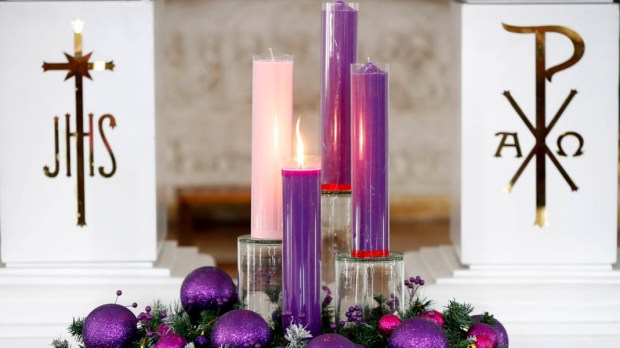Advent is a special time of preparation in the liturgical year, focusing our hearts on the celebration of Jesus’ birth in Bethlehem as well as looking forward to when Jesus will come again. To remind us of these and many other spiritual truths, the Church has chosen the color violet to be the primary color of Advent.
Violet has a long history and was a rare color in the ancient world, not easily made into dye that could be used with clothing. While it was traditionally connected to kings and royalty, it also became associated with penance, making it a somber color and chosen by the Church for penitential seasons.
Violet
In an issue of The American Ecclesiastical Review (printed in 1902), the author gives a unique explanation behind the reason why violet and rose were chosen for Advent.
Violet vestments signify on the whole Sorrow, and are meant to inspire a grave and thoughtful attitude in the faithful who attend the liturgical services. If you mix blue and red in liquid colors you obtain violet. Blue is the color of heaven and suggests that our thoughts turn away from earth. Red is the color of martyrdom, of blood, and of the flame which consumes the sacrifice. A combination of the two, which makes violet, is, therefore, indicative of sacrifice with a view to heaven, unselfish devotion.
In particular, violet is used in the season of “Advent, when the spirit of reflection and the purging of the heart (as a preparation to meet the poor and humble Christ Child in the Cave of Bethlehem) call for self-denial from motives in which heaven leads the soul against earthly attachments.”
Rose
Additionally, the color violet is interrupted on the Third Sunday of Advent by the color rose, to signal the coming joy of Christmas.
On the third Sunday of Advent … when there is a momentary interruption of the penitential strains lest the soul wrapt in continuous darkness might become disconsolate, the Church permits—with the sounds of music and the flowers on the altar—a light purple approaching rose color, to indicate the tone of hopeful joy which mingles with and relieves the application to penance. It is the encouraging caress of the Spouse, our holy Mother, bidding her sons and daughters to keep on bravely in the spirit of faith.
The Church understands that it is difficult to perform penance for an extended period of time and pauses such mortification so that we can anticipate the joy we will soon embrace.
[T]he season is long, the work tiresome, and the body weak. And as the laborer rests at times in the midst of his task, to take a glance at what has been accomplished, and to refresh himself with the anticipation of the joy that awaits him at the end of his work, so the Christian stops in the midst of Advent preparation to rehearse for a moment the sweet melody of coming Christmas chant and to take in the full meaning of the encouraging words of the Holy Spouse, his Mother the Church, as she calls out to her children “Gaudete,” that is “Be joyful,” the Lord, the Emmanuel, your consolation and Savior is at hand!
The colors of violet and rose are rich in their symbolism and remind us of the many spiritual themes behind the season of Advent. The next time you go to Mass, or see an Advent wreath, remember these beautiful truths and let them prepare your heart for Christmas.

Read more:
Meditate frequently during Advent on this quote from St. Paul

Read more:
Why is my priest wearing pink?

